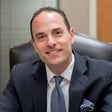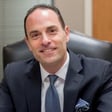Become a Creator today!Start creating today - Share your story with the world!
Start for free
00:00:00
00:00:01

161. Navigating Student Loans Amidst the Chaos | Meagan McGuire
Meagan McGuire is back on the show to break down the current landscape of student loans. Meagan Landress is a student loan consultant for Student Loan Planner. She obtained her finance degree at The Coles College of Business at Kennesaw State University. In March 2017, Meagan started her practice, Financial Coach Meagan, to help people begin their financial planning journey with student loan debt in the mix. In this episode, we discuss:
- Recent court rulings and injunctions against the SAVE plan
- What the election results may mean for student loans and borrowers
- The state of PSLF longterm
- PSLF buyback program
- Contingency planning
Transcript
Introduction to Medicine Redefined
00:00:07
Speaker
Welcome to Medicine Redefined, a podcast focusing on helping you reclaim ownership of your health. I'm Dr. Darsha. And I'm Dr. Altima Sharaja. We're your hosts, here to challenge conventional practices and uncover the stories behind pioneers shaping the future of medicine. Our conversations not only focus on the individual level to dissect common practices for health optimization, but also zoom out to enhance systemic change. Join us as we look to break the status quo, move the needle forward, and put the help back in healthcare.
Student Loans and Recent Changes
00:00:37
Speaker
Welcome back to another episode of Medicine Redefined. Our guest today is Megan McGuire, previously known as Megan Landress, who comes back on the show to help us make sense of what's going on in the landscape of student loans. If you've been paying attention to student loans at all or if you're a listener of the show, you know that that's something that we keep close eyes on.
00:00:55
Speaker
because we're personally invested and a lot of our listeners are as well. But the problem is with the recent passings and the back and forth between different administrations, the student loans are in a complete limbo. And so, Megan helps us make sense of this and brings us up to date with the current court rulings and the injunctions that were filed against the SAVE plan, which you might recall was the plan proposed by the Biden administration,
00:01:20
Speaker
We then talk about what the election results may mean for student loans and student loan borrowers. As of note, this was recorded prior to the election and now of course being released afterwards. Understanding that the Republican Party is in power, so to speak, then you can get a sense of what that means.
00:01:37
Speaker
We also talk about the state of the public service loan forgiveness program, both short-term and long-term. As personal pursuit of this program, that's something that I'm very interested in and I know a lot of people are as well. If you are, then you should be paying attention to something called the PSLF buyback program. Megan helps us break down what that means and what that will mean for you long-term and how you should look at that.
00:01:58
Speaker
And last but not least, contingency planning is always an important thing because there are no guarantees in life and certainly no guarantees when it comes to the student loan system. And these battles, if I may, lately have just given a sense of how we need to always be prepared should things go downhill. Although Meghan can switch her concerns that the likelihood that at least PSLS or some type of loan forgiveness, that to happen is very, very low.
00:02:25
Speaker
Without further delay, please enjoy this discussion with Megan McGuire. Megan, welcome back. Thanks. Thanks for having me. I'm excited to chat today.
00:02:34
Speaker
Excited, nervous, as I was saying a little bit, but hopefully you'll assuade some of our concerns here today. Last time I asked you this question, it was a bit tongue in cheek because I really didn't take it seriously. We were talking about PSLF and cancellations, maybe circa 2021 or first conversation about those misleading headlines and whatnot.
00:02:56
Speaker
However, over the last couple of months, really, I guess, effective July when Save came around and everybody got transitioned and things got put on halt and all those months, I guess, coming up on four and a half, five months of my PSLF time that hasn't counted thus far, I've started having those creeping thoughts is, is PSLF going to actually work out? So let's just hit you with that question off the start. Is PSLF getting canceled?
Court Hearings and SAVE Plan
00:03:24
Speaker
No, no, I think you can rest, rest assured that I think PSLF is good. It's safe. It's a statutory where some of the things that come along with save and the other income driven plans may not be statutory. So we'll talk a little more, more about that, but you're good with PSLF.
00:03:42
Speaker
Okay, good. I think we could probably end the interview at this point. All right, good. Have a good night, guys. No, so let's catch people up, right? I mean, there's been a lot of attention and some of it we all understand it's election time, right? And so the conversations are going to be louder and people are going to
00:04:02
Speaker
make their play both parties and what they're going to do and try to lobby some votes here and there. Maybe you could give just a high level overview to people over the last couple of months in terms of how the Supreme Court and the rulings going up and down just maybe like a 60 to 90 second, if you can, of why I even maybe ask you that question because I'm sure you know.
00:04:25
Speaker
Yeah, yeah. So the SAVE plan, S-A-V-E, that came out summer of last year. So when everybody was entering repayment for the first time after COVID, it was a big deal. And then SAVE was this brand new plan that was going to be
00:04:40
Speaker
A way to simplify the student loan system. It was replacing the repay plan and then eventually it was going to sunset the pay plan to really just pull together a couple plans into one to make things a little more simpler for borrowers.
00:04:55
Speaker
And it was very generous. It was 10% of discretionary income, but it had a higher poverty line deduction in the calculation. It had a really generous interest subsidy where it would waive accruing interest that went unpaid so the balance wouldn't be growing like things had been in the past.
00:05:13
Speaker
It had shorter forgiveness timelines for smaller balances, which was new. So it was really a step in the right direction, I think, for borrowers for better plans, simpler plans, more generous plans. But it was just that as well. It was very generous. And it was not brought about through legislation. It did not go through the normal legal process. It was brought about by executive order.
00:05:39
Speaker
And that's what makes it, I guess, sensitive or at risk right now with what's going on, is right now the court system is, or there's a couple parties that are suing, basically, saying, hey, this plan is unconstitutional. It didn't go through the right process.
00:06:02
Speaker
And so they're really challenging it. And what's happening right now is anybody who's on that save plan. And keep in mind, some folks were forced onto this plan. They were on repay, and they were forced into save because repay turned into save. So a lot of you guys didn't have a choice whether or not to be on this plan, but here we are. And so there's a pause on this payment plan right now. No one can make payments on it.
00:06:30
Speaker
The time that we're in this pause or this forbearance does not count towards any kind of forgiveness. But we've got 0% interest while the court system figures it out. So that's really where we're at right now. And it's problematic for sure. But we do have solutions. So I'll say that it's problematic, but I've got some solutions that we could talk through today.
00:06:52
Speaker
I think that's the challenge. In the past, we had the COVID pause that got extended and extended and extended multiple times. I don't even remember how many extensions we had. That actually turned out to be a pretty big blessing for those who were working in the PSLF landscape because we had zero dollar payments. I think I went nearly six years without making a payment just because how everything happened, I've talked about this before, I get married at the right time.
00:07:19
Speaker
not strategically for loans, but just happened to work out that way. However, these last couple of months haven't encountered, and I think that's what's given people a lot of anxiety, rightfully so. Oh, yeah.
00:07:34
Speaker
And I remember you previously talking about it's not just the fact that you have to make 120 payments. You also have to wait till those payments get registered and you have to stick to your employer. So, I mean, it's the government, right? Or whoever the person is going to be or the organization is going to be at the time who's holding on to those loans. We've also had multiple handoffs in terms of who is actually
00:07:57
Speaker
holding on to the PSLF program. I think last time we spoke, it wasn't mojila quite yet. I forget who was it. Oh, Fed loans. It was Fed loans. Then I went to mojila and now it's transitioning over to I don't even know who's the most recent Department of Ed. So the big guys. Right, right, right. So the big guys finally have it. But you can, you know, yes, the big guys have it. So maybe that gives you a little bit more
00:08:23
Speaker
Certainty in terms of a little bit more peace that are the big guys might be less likely to screw you over however Change happens very very slowly as we talked about it. The big guys probably move a lot slower, too So what I'm getting at is, you know It's not going to be 120 payments and then you are good to go if you really hate your job and you're stuck in that Sector you still have to wait but the challenge is now you might have to wait an extra six months eight months ten months twelve months Whatever however long this process gets drug out what?
00:08:54
Speaker
What good news can we talk to people about that? Because there is something called the PSLF buyback.
Understanding PSLF and Buyback Program
00:09:00
Speaker
What can you tell us about that?
00:09:02
Speaker
Yeah, so I think the PSLF Buyback is, it is good news. It is a program that also came out about a year ago. It's not at risk for any of the stuff that's going on right now that could go away. So PSLF Buyback basically says, hey, if you've got time and forbearance that is not counting towards PSLF for any reason, like you paused payments or your servicer put you into forbearance,
00:09:30
Speaker
The point is you weren't able to pay. Then when you reach 120 months of repayment or employment with your employer, including those months of forbearance, so they're not going to be counting, but if you add those up and you're at about 120 with those months included, you could still apply for loan forgiveness and then at the same time apply for the PSLAB buyback. Basically, it's an offer to pay for those months of forbearance.
00:09:58
Speaker
So it keeps your timeline intact, same timeline. It's just kind of delayed gratification because we can't do it now. We have to wait until we're at 120 months. But that is an option and that is a viable option for the forbearance that folks are in right now, which is a very positive thing.
00:10:17
Speaker
Absolutely. So, you know, let's get into some of the other things that we need to be aware of. Right. I mentioned upcoming election very, very soon. And you said that there are some outstanding decisions that we have to make or rather actually before I even ask you that there was a recent update that happened. Right. There was a court hearing. Can you catch us up to what the what the verdict was from that and how that might change something in the very near future?
00:10:47
Speaker
So we're actually still waiting on the response from the judge, but the court hearing was on October 24th and we're recording this towards the end of October. So we're still kind of waiting on the final say, but the hearing itself didn't go super well. And what I mean by that is
00:11:06
Speaker
Both parties came to argue their case on whether or not SAVE should, was SAVE in question, was it all the other income-driven plans in question for loan forgiveness? Was it PSLF in question? And at first it was kind of confusing because the judge didn't totally seem to understand how income-driven repayment worked. So that was a little embarrassing. But then we had- But that's surprising though, right?
00:11:33
Speaker
Yeah, not surprising. The court system, the judges, they have to rule on a wide variety of topics. But for folks who are immersed in this world, you have student loans. This is personal. This is going to affect your bottom line, your budget. And so I think that's why some folks were taking offense to it.
00:11:57
Speaker
Basically, what came from that hearing in summary was that it seems like they are getting real technical with the intention of the language of the ICR legislation, which handles the income contingent repayment plan and the pay as you earn plan.
00:12:18
Speaker
and also the SAVE plan. So not IBR, not income-based repayment, that's a statutory that's written into legislation, but this other language. They kept getting hung up on the fact that it kept saying repayment, where the question was, is forgiveness still a viable option for these other income-driven plans? Can we go ahead and process forgiveness for these longer-term forgiveness folks and for PSLF?
00:12:46
Speaker
There was no bucking at PSLF, so we're good there. But it was for those who are waiting on the 20 or 25 year loan forgiveness, could we get forgiveness for those guys, for those who have gotten to that point? And the answer was hold off on that for now. It seems like we have to have more conversations about it, which is a little nerve wracking.
00:13:08
Speaker
But IBR is safe, it seems like, and this is not over, so I wanna say that too. This is not over, it just means that this injunction just means a pause. It's telling the Department of Ed, hey, don't process forgiveness for longer term income driven forgiveness on any plan other than income based repayment. So new IBR or old IBR and PSLF, like PSLF is fine as long as we've hit 120 payments.
00:13:38
Speaker
and then save. Save is the obvious one. So that's kind of where we're at right now and we'll be waiting on the final decision on if save is going to be repealed and what's going to happen with ICR and the pay plan. Megan, do you mind just giving a quick overview in regards to this court hearing about what both parties are essentially standing for and what they're fighting for and why? I feel like some of our audience might be like that judge that are kind of like
00:14:06
Speaker
Why is this even happening? Yeah, yeah. So one side of the equation is arguing that this was not the nature of the income-driven repayment plans. The nature was not to forgive a bunch of loans.
00:14:25
Speaker
even though it was written into the language. Forgiveness was written into the language, but they keep getting hung up on the intent of exactly what that meant. And I take that to say they didn't realize how much loan forgiveness could happen through income-driven repayment. And in a way, I almost blame it on the schools because the schools have been taking advantage of this as an opportunity.
00:14:51
Speaker
to raise prices because they know that if people can't pay the loans off in full, they lean on loan forgiveness. Other side of the equation is of course fighting for, hey, this has been part of the language for years. If there was an issue with this language, it should have been brought about years ago or at the start of this.
00:15:12
Speaker
And SAVE is basically a extension of this language. That's why SAVE is kind of the, SAVE was like the big, it was almost like the nail in the coffin for this. It was, folks were already kind of upset about the availability of loan forgiveness through these income driven plans. Maybe it's too generous, whatever the argument is.
00:15:33
Speaker
save came out and it was kind of a sneaky way to get forgiveness because do y'all remember when it was it was said hey we're gonna do 10 or 20,000 of loan forgiveness for everybody y'all remember that back in like Covid days and
00:15:48
Speaker
Yup. It didn't go anywhere. It was dead in the water at a certain point. Save was the backup plan for that. It was, okay, well, if you're not going to allow us to forgive just loans and a lump sum, we're going to come out with a really generous income-driven plan that will do essentially that just after repayment. It was tacked on to this ICR statute.
00:16:15
Speaker
So that's where we're at. It's just this big argument over what did the law intend or what did the language, I mean, intend and how is the Department of Ed supposed to interpret it and execute this. And so that's why there's a lot of drama. Where IBR is very clear. It says there is loan forgiveness after no more than 25 years of repayment.
00:16:38
Speaker
very clear or the ICR language is a little less clear and why they feel like they can argue against it. When you're talking about the party that's arguing about this language and rather than the words, rather the intent behind that, you're talking about the Republican Party or conservative. Yeah. Yeah. Didn't PSLF originate was signed by Bush, right? 2007?
00:17:07
Speaker
So are they, is it kind of just not, Hey, we didn't actually realize the, this Pandora's box that was going to have to pay 20 years from now and backtrack. And that's kind of what's happening right now. Kind of. Yeah. Not with PSLF though. PSLF is separate. It's more like the income driven plans themselves. When was that? I thought they would, they went in at the same time, 2007, it was either going to be PSLF or 2025, or did that come later on? Was that like an adjunct?
00:17:34
Speaker
It was separate, different timelines. So PSLF came about 2007 and then we had Repay technically was second. Let me see. Hang on. Let me think about the timeline again.
00:17:50
Speaker
Let's see, pay was first in 2014 and then repay came about in 2016. That was the timeline. So it was working its way through like trying to get implemented. So PSLF was first, then we had pay and then we had repay. Yeah. If I'm thinking about it chronologically. Okay. So I'm just trying to understand the history of it, right? So the PSLF primarily initiated, I don't know if it was initiated, but I know of a signed up by
00:18:20
Speaker
the Republican Party. And so I guess now President Obama was in office when they had said, OK, if you're not going for loan forgiveness for 10 years, you're still going to. OK, so so they're basically fighting that additional part. And so that that makes a little bit more sense. Correct. Yeah. Obama was part of the pay and repay era. And then Bush was the 2007 era. Got it.
00:18:44
Speaker
Yeah, so that I think any time it's election time, it gets to be all these topics. I think, you know, they're they're always in the background. Policyholders are talking about it. The people who care about them are always talking about it or like there's nothing new about this to you and Travis and your whole team. Right. And even some of our listeners and us, because we've had these conversations for the last three years. But election time, it's front and center on everybody's mind. Yeah, I guess.
00:19:13
Speaker
How do you advise your clients or just people in general to be able to sift through the noise for the signal? What is it that people should be paying attention to that's actually going to make an impact 10 years down the road, 20 years down the road to their day to day and even their future jobs, employers and that kind of stuff versus the stuff that they should just sit tight and ignore about?
00:19:39
Speaker
Yeah, it is hard because there's a lot of information and I feel like to what's a little frustrating to Travis and I at Student Loan Planner, it's stuff that gets thrown out there that we kind of know is not going to go anywhere. It's almost meant to be like a good faith like, hey, I want to do this, but we know it's not going to go anywhere.
00:20:00
Speaker
So, for an example, there was a recent announcement about additional forgiveness opportunity through canceling a certain amount of interest above, like, if you had any accrued interest, they were talking about canceling that accrued interest, or there was a couple other nuances to that.
00:20:19
Speaker
that was announced and then it was pretty much immediately struck down. So it was almost, and I think they knew it was going to get struck down. So it's almost like the good faith stuff that's thrown out there that we know is not going to really go anywhere because it doesn't have any legal standing is pretty frustrating. Um, but I think the best advice I could give somebody who's like just trying to figure out, Hey, what should I pay attention to is, um, I think
00:20:45
Speaker
For one, you need to know, of course, what path ultimately are you trying to get to? Are you trying to do PSLF? Are you trying to do income-driven loan forgiveness? Or are you someone who's going to ultimately pay off these loans? So filter yourself into one of those buckets first.
00:21:01
Speaker
And then I think for PSLF folks, right now what's important is if we're on income based repayment already or pay as you earn, if you're on the pay as you earn plan right now already. Good news is
00:21:17
Speaker
Your payments right now are counting towards PSLF, so we don't have to worry too much about all of this drama right now. Just keep chugging along. But if you're someone going towards PSLF and you're on the save plan, you're in this save forbearance, the months that are happening right now that are in forbearance, we're not counting.
00:21:36
Speaker
those aren't counting towards PSLF, but we have the fallback of the PSLF buyback. So that's something we have in our back pocket. And our suggestion right now for PSLF folks is to hold off, well, two suggestions, and it kind of comes down to your risk tolerance.
00:21:51
Speaker
One suggestion would be this this is going to be a relatively short period of time like I think this is going to work its way through the Supreme Court in the next. We're in October end of October. So in the next two to four months. So maybe early.
00:22:07
Speaker
spring of 2025 might be the latest by the time we hear what's going to happen with Save. And so I would suggest for those that are okay with waiting, just hang out in the Save forbearance. It has 0% interest. It's not counting towards PSLF, but we can lean on the PSLF buyback.
00:22:26
Speaker
And then that could be something that you do on the back end of your repayment journey, no matter what happens with Save or having to switch to a different plan later. If that uncertainty makes you nervous, then you can go ahead and switch to income-based repayment, which we know for a fact is going to count towards PSLF right now.
00:22:46
Speaker
So if you like certainty and you're okay with making that switch and you're okay with maybe a change in your payment for the benefit of having certainty, then go ahead and make the switch over to IBR. The applications are back up and running and you could do that now.
00:23:02
Speaker
That's my suggestion for PSLF folks until we know about the fate of SAVE. Then for longer term forgiveness folks, I think the risk tolerance question is still the same. If you're okay with waiting to see what this is going to shake out to be, just hang out, maybe continue to put money into savings, prepare for maybe having to
00:23:23
Speaker
If you want to buy back months in the future potentially, that could be a good idea to have some money set aside for that in case it will apply to PSLF folks or non-PSLF folks where you can purchase months towards the forgiveness. But I think right now it really is.
00:23:40
Speaker
annoying as it sounds, it is annoying. I think we are in a pause where we're not going to know exactly how to react. But I think if you have kind of a calm head, you know, like, okay, well, if this is going to happen, if save is going to be repealed, you know, start to think about your backup plan. And it's probably going to be IBR income based repayment unless they come out with a, they come back with repay or they come back with pay.
00:24:06
Speaker
So start to have an idea of what that might look like just to prepare yourself and then kind of wait or make the switch if it's really going to make you feel better.
00:24:17
Speaker
Just understand this clearly. So they got rid of repay altogether and shifted everybody to save, but they did not get rid of pay, correct? Yes and no. So they didn't get rid of pay as long as you were already enrolled on it as of July. Yeah. Right. So you can't switch into pay. Right now. And the IBR is 20% discretionary income. What does it remind me?
00:24:40
Speaker
IBR is 15%, thankfully, so it's less than ICR. Right, okay, so repay and pay over 10%. Yes. Got it. Let's break this buyback for me down a little bit, right? Let's say we have a trainee who's making just, we'll keep a simple $50,000 a year. Their payment is going to be very, very low.
00:25:04
Speaker
When they are buying back, they're presumably going to be attending. Let's say they're making 250. At that point, how is the buyback going to work exactly? Are they going to be paying back those months for that residence salary they were making at the time, the months they lost, which would be now, or are they going to have to pay from that attending salary? What's your gut in terms of how that's going to be calculated?
00:25:29
Speaker
Yeah, that's a good question. And it is already spelled out in the PSLF buyback language where it would be off of the income from that tax year. So when you're attending, uh, when you are, no, sorry, the tax year that the forbearance happened. So now that person would pay off of the residency income. Yeah, thankfully. Yeah. Okay. And so that would be, you're making a lump sum payment to kind of get that back at that point. And that's where this evening comes in. Yeah.
00:25:57
Speaker
So other strategies, like I know there was a long time ago in the very, very beginning, maybe circa 2017 that you guys were and maybe other knowledgeable people in the space were also saying, oh, listen, if, you know, you have some uncertainty about PSL Live, this is prior to people actually getting forgiveness, then maybe you could put a high interest savings account, which fortunately there's a lot of them now on the side. And then in our recent conversations that we had, you're no longer recommending that. And a lot of people aren't doing that.
00:26:27
Speaker
But for this specific context, that makes sense.
Financial Planning for Student Loans
00:26:30
Speaker
Other things that you haven't already mentioned that might be worthwhile if we're talking about contingency planning, it doesn't necessarily have to be from a student loan perspective. You had mentioned your financial planner, right? We talked about this, right? And that's kind of how you got your start. What other things are you counseling your clients about these things?
00:26:52
Speaker
Yeah, and one last thing I'll mention too, in regards to the student loans, and I'll talk about other financial tips, IBR, income-based repayment, there's two parts to that plan. There's new IBR and old IBR. New IBR is if you are a new borrower, meaning you did not borrow before July of 2014.
00:27:14
Speaker
Let's say you are relatively recently graduated, newer in your career, or maybe you didn't borrow for undergrad and you borrowed starting in 2015. You're going to be eligible for new IBR, which is essentially the same thing as the pay plan. Pay is 10 percent of discretionary income and a 20-year timeline to forgiveness without PSLF. Then with PSLF, of course, it's the 10-year timeline.
00:27:43
Speaker
I do like to mention that because IBR, while it's not on paper, if you were just to search IBR, it might just come up and say, oh, it's based on 15% of discretionary income, which is higher than the saved 10%. But if you're actually a newer borrower, it might actually look a lot closer to what pay was going to be or the old repay was going to be, which is better.
00:28:07
Speaker
I do want to mention that to where plan B, if it's IBR, may not be such a bad plan. That's one distinction I wanted to point out.
00:28:17
Speaker
So let's say you're somebody who you are really close to the PSLF timeframe and let's say you've got like a couple years left or like a year left and you're not sure if save is gonna work out, you really hate your job, right? Let's say you just really hate it, you're ready to go as soon as possible and all of this is really stressing you out.
00:28:43
Speaker
A couple thoughts, a couple tips. We're huge advocates of not letting your student loan plan dictate your career path or your financial plan. I think it's more important because your job is your day-to-day. That's what you do every day. It's what you come home from. It's what you think about. It's what you're doing for a lot of your life. It is important for you to enjoy it somewhat or I know it's still work,
00:29:11
Speaker
It's important to not be miserable. And so if you're really just grinning and bearing it for the student loan purposes, when we do some financial planning calculations, if we're comparing that public service job to maybe a private sector job where income might be better, the math tends to work out fine the other direction if you were to forego PSLF.
00:29:33
Speaker
it might come at a cost of time. Maybe you still have the loans around for a little longer because you're going towards the longer term forgiveness timeline or we're going to end up paying the loans off. But as long as the income makes sense, you're not taking a huge pay cut leaving public service, you're going to something lateral or somewhat higher in income, then the math does tend to work out fine for your longer term financial plan.
00:30:03
Speaker
And i say that because a lot of people like really stress getting pslf like that is the end all be all and it doesn't have to be feels like it. Because in the now the math looks like very different but in the long term it doesn't make a ginormous difference i do like to mention that.
00:30:23
Speaker
But that's my first initial thought from a financial planning perspective. Quick follow up on that. Those people that you encounter that you're referencing there, how many of those are big readers of fire and those types of movements? Because I think that's where it comes. I got my entry card into this whole situation.
00:30:46
Speaker
in May of 2017 when I graduated and I just had nothing to do for a whole month and I read like
00:30:52
Speaker
every blog on White Coat Investor, and the whole situation about live like a resident. Then you go from there to Physician on Fire, and then you go to Ben White and all these stuff. At that time, everybody's talking about, no, you're going to live like a resident for the first five years out of residency. He still probably does it, although not as much, and sharing these success stories of people who paid off $400,000 in five years of their loans and that kind of stuff.
00:31:21
Speaker
And even Mr. Money Mustache talks about living on like $50,000 and I think that's probably a millionaire at this point. And so it's almost like this badge of honor that you have to suffer for a couple of extra years after training, but you've paid off all this money. And I think the key word there is suffering. And so maybe for people around my generation of graduating medical school, and you've already got these high stress people you were talking about earlier,
00:31:52
Speaker
just sit there and not do anything. And I was thinking how many doctors are going to be good at that, right? Just chill and don't do anything. People who are all action oriented. So how many of those clients that you see are big readers of that and you have to kind of unteach them, that philosophy if you will.
00:32:15
Speaker
Yeah, I think that's a really good question. It's interesting because I do remember that stage around that time that they were huge. Those folks in the financial planning space, financial blogging space, that was their time. And it still is. They're very prevalent. A white coat investor sends out a daily newsletter. It's impressive daily every day.
00:32:42
Speaker
But I think what folks are starting to also feel and kind of understand with their finances is that that doesn't have to be the answer, right? I think that was also along the same lines of the same mentality of that there's only one way to tackle debt and it's to pay it off really aggressively.
00:33:05
Speaker
and to not really trust certain programs like PSLF or income-driven forgiveness. Because again, within the debt space at all, forgiveness does not exist with any other kind of debt. So historically, the mentality has been pay the loans off as soon as possible. No questions asked. Pay it off like your hair is on fire.
00:33:26
Speaker
And there is some suffering in that, right? There's prioritizing that debt over all else, over your health, over your mental health, you know, over a lot of things. And so with that being said, I think
00:33:41
Speaker
There's a combination of folks that we typically talk to. We talk to some folks who are still on that train. They're still very much having a real big problem with thinking about a different way of paying the loans back versus payoff versus going towards loan forgiveness. That doesn't sit right with them, but the math is telling them to go that route.
00:34:02
Speaker
And then we have other folks that have tried the suffer route. They've tried the grin and bear it just, you know, pay things off as soon as possible. And it's not worked out for one reason or another because either they got exhausted or life happened. They had a kid and things changed or
00:34:20
Speaker
a family member was sick and money was different. I think we've worked with folks on a couple different capacities, but I think what it boils down to is personal finance is very personal. We could talk about the math answer all day with these forgiveness programs and what they could be, what they might look like, and we could compare them to the payoff strategy, but it does come down to that person and their desire for what they want to deal with, what they want to commit to.
00:34:50
Speaker
Um, so I don't know, that might've been a roundabout answer on like how, who we talked to, but, um, there's a range of the folks that we typically talk to there. Yeah, absolutely. And I think Altimash and I both being on social media, the way that we're wired, we tend to see more of the people who, you know, go into the fire, the fat fire realm of things. And, you know, just a few ideas out there. I know, um, Altimash, have you read Bill Perkins that with zero? I haven't yet, but I know about his philosophy.
00:35:21
Speaker
Yeah, I read it. Okay. So, Megan, I don't know if you know Bill Perkins or Die With Zero, but essentially his philosophy is, you know, we come to this world and the, quote unquote, old school mentality is to, you know, go through the suffering, delay gratification, keep saving, keep saving, keep saving for a rainy day. But where is that rainy day, right? Every day can be rainy if you really want it to be. And so his philosophy is spend, enjoy the present moment, enjoy your life for what it is now, and you can really kind of do both things, right?
00:35:52
Speaker
What social media has allowed is bringing back historical context, like even stoicism, right? People who follow Brian Holiday on social media, and then you develop this stoic philosophy of, okay, delayed gratification, I'm gonna work the job and be suffering for five years, but in the end, I will have a much better future. And I tend to think about this as, why do people work so hard now and save their money and try to grow it? And it's because they're hoping for
00:36:21
Speaker
a better future present moment. So they're hoping that their present moment in the future is better than the one that they're currently in. When you really break that down,
00:36:31
Speaker
The present moment is singular, right? It's going to be the same regardless. And we're looking at external factors to now bring us that happiness and bring us that joy and most often money, right? And we're looking at money to kind of buy those things. So, you know, just kind of throwing that idea out there. I really appreciate your insight at least, dude, you know, letting people know that it's not worth the suffering. I truly don't think it is to be in a job where you're solely just kind of thinking about your finances, you know, as important as it is, especially in today's climate with inflation.
00:36:59
Speaker
just a crazy politics, you know, that we're talking about. And when judges can't understand what's going on and everyone's trying to learn about what the writing is, you know, there's a lot obviously going on. So it is important to kind of stay on top of these things. But in the end, too, I think we all have to kind of look at our own happiness and see and see how much that matters to the grand scheme of things. Yeah, I wondered, actually, sorry, I just want to double down on that. Darcy was talking about stuff that I think a lot about again,
00:37:27
Speaker
The Die with Zero thing was actually really interesting because when Bill Perkins came out with that, I guess maybe it was probably about a year and a half,
Balancing Work and Family Life
00:37:35
Speaker
two years ago, I noticed a lot of financial people or oscillating. They're not necessarily financial advisors. I know Jimmy Turner has been on here, phenomenal guy. He talks a lot about that. He loves that book too. I think actually Jim Dolly had put some stuff up about that as well and how it really moved these people. You think about
00:37:58
Speaker
When you talk to people who do work really, really hard and they're grinding day in and day out and they're sacrificing time with their family and their kids younger years because they're working so hard to be able to make that money. So when they get older, they can retire early and then they can enjoy that time with their family.
00:38:19
Speaker
And maybe their kids are gonna be in their teenage years. Maybe their kids are gonna be young adults at that time when you can finally achieve that goal of being financially dependent and retire early. And I think a lot of times these folks, myself included a couple of years ago,
00:38:35
Speaker
had this idea that you'll make this money, you'll have this big nest egg, and then you'll enjoy the, quote unquote, finer things in life. You'll travel with your family, you'll do all that kind of stuff. But the fact of the matter is, if you sacrifice all that time early on in your kid's
00:38:51
Speaker
lives, you miss those soccer games, you miss those musical plays, you miss all that stuff. Well, when you're ready to enjoy that time with your family, your family's going to not want anything to do with you. Your kids aren't going to want to be around you because you weren't around there. Because you didn't build those relationships, right? Now they have relationships with friends and boyfriends and girlfriends and that kind of stuff. And they'd rather go
00:39:11
Speaker
on vacations with those people. And so now you just got this money. I say this because I actually have patients come and share some type of story like that with me where they're like, yeah, I'm retired, but like the kids don't want to
00:39:23
Speaker
be around or this and that kind of stuff. This conversation just got me thinking about that. It's like, okay, well, what's the point? We're all probably familiar with some of these studies that recently come out that people who spend more money on experiences seem to be a lot happier and do a lot better rather than on objects and materialistic things and whatnot.
00:39:43
Speaker
And guess what, what I'm sharing is, you know, that got me thinking. It's like, you know, Darsh is phenomenal at traveling the world and enjoying it right with his better half. And I'm sure that if he had some kids like that, they're going to be into that experience and those are the memories you're going to build. So that's another piece that I think is really worth considering. It's like, why do you want to save that nest egg and become financially independent? You know, so just to kind of, I think we're all commiserating about the same thing here, but just two cents there.
00:40:09
Speaker
Yeah. Yeah. I love that. Well, and I think too, and that's why I said the thing about the financial planning, you know, thought process there, like where PSLF doesn't have to be the end all be all or, you know, you don't, you also don't have to take the flip side of things and be crazy aggressive towards paying and putting everything towards your loans. Like I think there's a, there's always this happy balance that you can find with the right game plan.
00:40:34
Speaker
that prioritizes the things that are really important to you that make you happy and the things that are financially responsible. It doesn't have to be one or the other. And so I think that's what's also really beautiful about financial planning is, you know, I know we're talking a lot about student loans, but putting this into a plan and knowing what your goals are and what your priorities are, like being aware of those things is really important. And you can put together something that's realistic and doesn't have suffering as part of it, right?
00:41:05
Speaker
Life's too short. We're totally on the same page here, I think.
00:41:10
Speaker
I want to take a little U-turn and come back to something that you had discussed earlier when we were talking about the conservative party arguing that, hey, we really didn't expect this large of a forgiveness burden. And you mentioned that some of the reasons or one of the reasons for that is schools have kept increasing their tuition prices just astronomical rate. And we talked about this, I think, during one of our previous discussions of how
00:41:36
Speaker
borderline criminal that is because there is no upper end limit. There's no cap in terms of what you're paying in this tuition.
00:41:44
Speaker
Is that something that you're aware that is also being looked at during these discussions? I would think that some sensible person would say, why is this happening? Oh, we're on the hook for all this extra money. Why is that happening? Oh, it's because, I don't know, Rutgers University in state New Jersey is going to be $100,000 by the time, or more than that, probably by the time my daughter's ready to go to school.
00:42:07
Speaker
At this rate, that's not sustainable. Is that something that's in the works or in the discussions about, hey, we need to cap these universities that you can't charge more than this? Are there any laws or anything like that?
00:42:19
Speaker
So yes and no. This has been looked at in the worst cases, so schools that were legitimately defrauding students or closing down before they could graduate with the degree that they were at the school for. They did do a good job with coming in and implementing what's called the borrower defense program.
00:42:40
Speaker
And so if you feel like you've been defrauded by your school or they had deceptive enrollment practices for you, telling you you're going to graduate with this degree and make this amount of money, and there's a few different stipulations that you could argue. But if you felt like that was you or your school literally closed while you were in the program and you weren't able to complete it or transfer credits to a different school,
00:43:06
Speaker
then there is that program for you where you can apply for discharge of your loans, either partial or full discharge. But that's the worst case scenario. Where we find issue is also the middle ground where who says that nursing school can't cost $100,000 a year?
00:43:29
Speaker
No one. No one says it can't. And we live in a capitalist economy nation where businesses can set their own prices for what they deem the value is. And our system for student loans is you can borrow up to the cost of attendance. And the school sets the cost of attendance.
00:43:48
Speaker
It's this weird zone where it's like, can we tell businesses or these universities, these schools how much to charge? That could be a slippery slope because then what else can we tell businesses to charge for their services or for their value? I think it's come down to where they're looking at the most extreme cases.
00:44:14
Speaker
But I think also people in general are reconsidering school altogether. Unless you have to go, like for medical professionals, like you're going to have to go to school, right? You can't learn that on YouTube. But for other people, it's like... Well, that's a business idea right there.
00:44:34
Speaker
No, I mean, in all seriousness, it's funny that you say that I pulled a bunch of my third year students aside and I was giving them some tips of how to be successful in future rotations. I said this, I was like, guys, 80% of probably what you're going to learn from me, maybe more than that, a combination of AI and YouTube.
00:44:55
Speaker
You can learn that, right? I mean, there's the experience and some certain skills that is what I think the attending adds a tremendous amount of value, right? The anecdotal experience, that's where we offer value. And some unique techniques that we've just... But again, I put that in that skill set and experience category as well. It's phenomenal. It's phenomenal what ChatJPT can do now.
00:45:18
Speaker
Darsh both and I have kind of upgraded and this is not a an ad for chat GPT by any means but All AI is pretty cool, right? Right Yeah
00:45:34
Speaker
I mean the the amount of a eyes that come in when it comes to research and all this kind of stuff So it's an absolute game changer over the last two years and acquiring education. So it really does does beg the question It's like why the hell would somebody go to a for your undergrad degree and stuff? I mean, so there's got to be shortcuts to the system that we need to start figuring out and our Darsh and I were talking about a podcast with Eric Weinstein talks about shortcuts everywhere and you just need to identify those and so Maybe maybe that should be part of the that planning process too. But again, I
00:46:05
Speaker
And I don't remember if we talked about this. This is why these conversations need to be had at the middle school and high school level, right? This has got to be part of that curriculum so you can start making those informed decisions and not have to figure out, okay, all right, well, I've already made these, quote unquote, bad decisions and now I'm
00:46:21
Speaker
I'm stuck. How do we bail out of this? It's actually, if I think about it, it's an analogy is the sick care system. When we see patients when they are sick and we're trying to get them out of a mess and you're seeing people on the back end when they're in this mess and you're like, oh man, if we only made some smart decisions early on, we wouldn't have had the issue. In our case, you wouldn't have had this disease at this stage or this injury. A lot of similarities there.
00:46:51
Speaker
Yeah, definitely. And I agree. I do think conversations about the return on investment need to be had a lot more about school because I think the cost of tuition, the cost of schooling has outpaced anything. Outpaced wages, inflation, outpaced home prices too. It's wild, the percentage of increase per year.
00:47:18
Speaker
The conversations do need to be had about what is that return on investment. I do think, this sounds pessimistic how we're talking about it, but I do think a medical degree, like going to school to be a physician, a dentist, a vet, there is still value. If you have no other means but to borrow to go to school, and that's been your dream to be this profession, to practice this profession.
00:47:44
Speaker
you're going to have to borrow the loans to go to school or get scholarships or find grants, ways to reduce the cost of attendance. But the math still works out to where the income potential and you doing what you wanted to do with your life, with your career, it still makes sense. There is still a game plan that you can have to pay down the loans. You can think about it as a tax on your income post-graduation.
00:48:13
Speaker
But that's the return on investment. You've got that great income post-graduation after your training and you pay a tax for your schooling for a period of time and then you're done. So that's how you can maybe reframe it to be a little less scary if it is important to you to go to school for something that you have to borrow loans for.
00:48:34
Speaker
Yeah. I think you answered my question when you were talking about how, you know, it's up to the college really. And we live in a capitalistic society, but I guess I'll reframe it too. Is there a world where it's actually beneficial to possibly even get rid of these loans, public service forgiveness? Cause I, I've listened to podcasts where there's older medical doctors, maybe in that quote millennial boomer age where they're like, we did it and we can get rid of these loans. And you know, it's not a big deal, um, et cetera. And maybe it ties into.
00:49:04
Speaker
about the court case and why they're looking really just at the wording. Like what is that deeper level? So I don't know if you can tie that all in together, but one, is there really a benefit to a world where these colleges keep increasing their prices? And two, what are we masking with just looking at the wording? What is actually that deeper level that the party cares about?
00:49:26
Speaker
Yeah, I feel like so.
Political Challenges to Loan Forgiveness Programs
00:49:29
Speaker
Let's see. I think the deeper level. I'll kind of think through that for a second. I think at a deeper level.
00:49:38
Speaker
I think we are in a situation where there is a lot of student loan debt outstanding, a lot. And we are looking at the symptom, kind of like you were saying, and kind of in medicine, like we a lot of times are looking at the symptom, not the front side of the problem. And so the symptom is what people think needs to be addressed right now. And it feels like it's too late to kind of look at the front end side of the problem.
00:50:06
Speaker
So, I think what is possibly happening is on the Republican side, we're wanting to reduce costs, honestly, because this forgiveness is expensive. It takes away from where money could go. Not compared to other projects, like student loan forgiveness is not the most expensive thing on the docket that people are talking about.
00:50:30
Speaker
uh but it is an expense and if they're trying to cut expenses somewhere like that might be one place that's kind of low hanging fruit if they're able to make some movement there um on on tax dollars i mean because this you know forgiveness itself is one part of the problem there's also the
00:50:47
Speaker
So longer term student loan forgiveness also has that potential tax implication if you remember us talking about that before where when there's a balance forgiven on not ps left but longer term forgiveness they're supposed to be a taxable consequence for that because the irs sees that as a.
00:51:06
Speaker
benefit to you. And so they tax you on it as if it was income. Well, Congress has been not anticipating those tax dollars coming in because they're aware of how problematic that tax implication is for people. And so I think really what's kind of boiling that down, I feel like it comes down to money.
00:51:28
Speaker
I feel like it comes down to trying to stop the problem, probably in the worst way, affecting people who already knee deep in the problem versus looking at the front side of the issue and trying to nip it in the butt from there.
00:51:43
Speaker
So, are we misguided in how we're treating this? I don't know. Because on paper, if they are to cancel the save plan and cancel some of these income-driven forgiveness plans, they can say, hey, we saved X amount of dollars from going out the door over the next four years, right? So, that's maybe kind of at a deeper level what it's coming down to. My thoughts, but I don't know. What do you all think about that before I address maybe your second part of the question?
00:52:09
Speaker
Well, just to kind of put some numbers on it, I did a quick Google search. As of September, I think of this year, we're looking at 1.6 trillion in federal student loans, which makes up about 6.6% GDP.
00:52:27
Speaker
It's not a huge thing, but it's not something to scoff at. There's a lot of good that can be done with that. Just to give people context, because something that a lot of people talk about in terms of how the United States is so inefficient in terms of spending their healthcare dollars. In 2023, the US spent about 4.8 trillion on healthcare. If you compare it from that standpoint, I think Darsh and I were talking this morning about
00:52:50
Speaker
Dr. Marty McCarry in his new book Blindspots and talking about how corrupt, and this is more paraphrased, the health care system is in the United States and how much more money we spent compared to some of these other developed countries and we're not getting healthier. Maybe that gives people a sense of, all right, that is pretty significant burden that we could be doing and those dollars could be going to other places.
00:53:18
Speaker
We weren't just racking up these these bills and that kind of stuff. And so certainly a complex situation. But I think it really helps when you guys over a student loan planner and a lot of other similar folks.
00:53:34
Speaker
try to sift through the nonsense to simplify it for us. I find it really funny. It's like Travis is like a reporter, almost like a war zone, right? He'll be like at the airport and he'll do a quick live stream just to catch people up. And I always find them to be super funny. He's like, hey, guys, coming to you from the front lines. Here's an update on that.
00:53:55
Speaker
on the hearing. So we just got to get you behind the camera there, Megan. anything else to close? I think that's pretty much all I had. But or Megan, the floor is your if you have any parting words for for the people to kind of keep calm amidst the chaos. Anything you got?
00:54:15
Speaker
Yeah, I think I do want to just acknowledge that this is a stressful time. Don't feel like you shouldn't feel any type of way about what's going on. This is a pretty stressful time. There's a lot of uncertainty, but I think hopefully you can find some comfort in knowing that there are alternatives to what you thought your plan was going to be if it may change here coming up.
00:54:37
Speaker
And it may not be as bad as you thought it was going to be. So it might be a good time now, especially if your payment is paused to just take a look at, okay, well, if this original plan doesn't work out, what can I pivot to? And what is that going to look like? That way you can start to kind of mentally, maybe financially prepare for what that might be.
00:54:57
Speaker
There's support out there. If you need some one-on-one help, we can help. Student Loan Planner, we're here for you. We've got a lot of free content on our website too, like calculators that you could use to calculate your payments, blog articles, things like that. You're not a loan. You are certainly part of this unfortunate club that we've got, Student Loan.
00:55:20
Speaker
borrower club that I'll call it. But definitely we're going to get through this and it's hopefully coming to an end here soon.
00:55:29
Speaker
Yeah, and I'm thinking about what you said earlier and reminds me of a friend named Ryan Inman used to talk about, you've mentioned this, personal finance is personal. I think it's really important for people to understand as well as you get a lot of unsolicited advice, you hear a lot of people talking about their specific situation and they don't understand the context of your life and what you're going through and
00:55:53
Speaker
your struggles and your job and your situation. I say this because my wife, who is extremely debt averse, and her and I talk about this all the time, and she had a discussion with somebody who was talking to her about looking at future employers, hospital base,
00:56:11
Speaker
loan forgiveness versus private practice and her debt burden is even greater than mine, north of 300,000. What was told to her is, oh, there's no way you're going to pay that back. You have to look at loan forgiveness. There's no other option for you. That's really interesting because this person doesn't really know everything, doesn't know her. She's the most frugal person I've ever met in my entire life and I have no doubt that she could take any job and
00:56:37
Speaker
and, you know, be fine. And so it's just really interesting. So just want to caution people as you continue hearing a lot of scare tactics and advice out there. Just know that it might not be anything meaningful for your personal situation and keep going back to you. And this is really where it's important to have a really good coach who can keep you grounded. Somebody like Megan, you guys can reach out to her, right? Student loan planner. Where else can people find you? And, you know, you'll let us know.
00:57:06
Speaker
Yeah. Yeah. Thank you guys so much for having me and thanks for letting me kind of blab about student loans. I hope this was helpful to your, your audience today. Yeah, absolutely was Megan. It's always a pleasure having you on real quick though. If people want to get in contact with you, can they email you? Where can they call you? What kind of resources should they go to?
00:57:28
Speaker
Yeah, sorry, totally missed that plug opportunity. So Student Loan Planner, studentloanplanner.com. You can also reach out to me personally. My name is spelled a little funny. It's Megan, but M-E-A-G-A-N. I think there's like 12 ways to spell Megan, but that's how you spell mine.
00:57:46
Speaker
at studentloanplanner.com. And then yeah, our website is super helpful. We have a general help inbox as well. You could just email our general inbox for general questions. But if you'd like someone on one help, you can reach out to me and I'd be happy to help walk you through your situation. Fantastic. We'll get those in the show notes. And you may remember this last question. And we'll ask it again, because maybe your thoughts have changed throughout the years and post COVID and whatnot.
00:58:13
Speaker
How do we put the health back in healthcare and feel free to take this in any direction, financial or whatever it may be? Oh my gosh, yeah. I actually do not remember what I said before.
00:58:24
Speaker
Um, let's see, uh, health back into healthcare. I think, okay, actually I probably said something about being proactive, like, cause I think financial planning is a very proactive thing. And I think your healthcare can be a very proactive thing too. So, um, you know, take your vitamins, get your steps in and, um, be proactive about your health. So your health care provider can, uh, can help you stay healthier.
00:58:51
Speaker
Love it. Love it. You heard it here first, folks. I can't speak. But that goes very well with the theme of what Altimash and I talk about on the daily. So again, thank you so much, Megan. I can't wait to get someone out there. Thank you.
Conclusion and Podcast Intentions
00:59:05
Speaker
Thanks for listening to another episode of Medicine Redefined. If you enjoyed this episode, please be sure to check out some of the additional resources in the show notes. Please also check out our social media platforms where you can find more content like this. You can follow us on Instagram, Twitter, and TikTok at MedRedefined.
00:59:22
Speaker
We also want to thank our team for the production of this podcast, specifically Ethan Joo on video, Harita Yehkori on social media, Zana Blugmani on research, and Sarah Hahn for newsletter. Oh, and if you want to get similar bite-sized information delivered to your inbox every Sunday, please be sure to sign up for our newsletter. Also, if you enjoyed the show, please be sure to subscribe, review, and share with anyone who you think will gain value from this as well. Now, time for the ever so important disclaimer.
00:59:49
Speaker
This podcast is intended for general public use and is for educational purposes only. It does not constitute the practice of medicine, nor should be construed as medical advice. No physician patient relationship is formed and anything discussed in this podcast does not represent the views of our employers. We recommend that you seek the guidance of your personal physician regarding any specific health related issues.

















